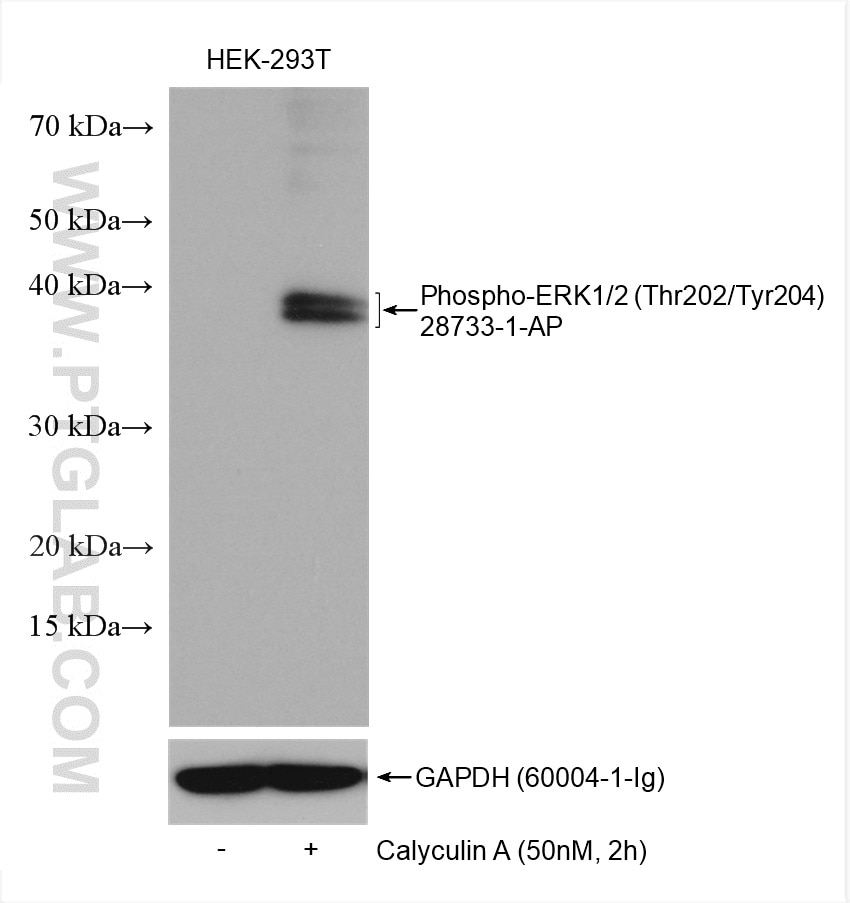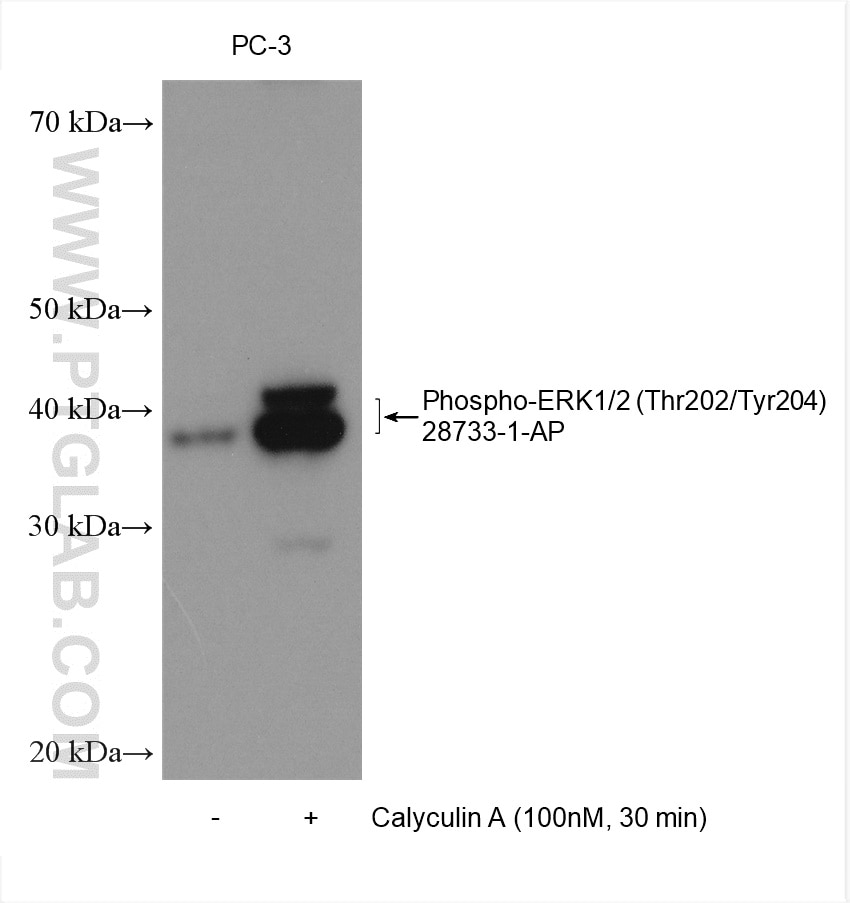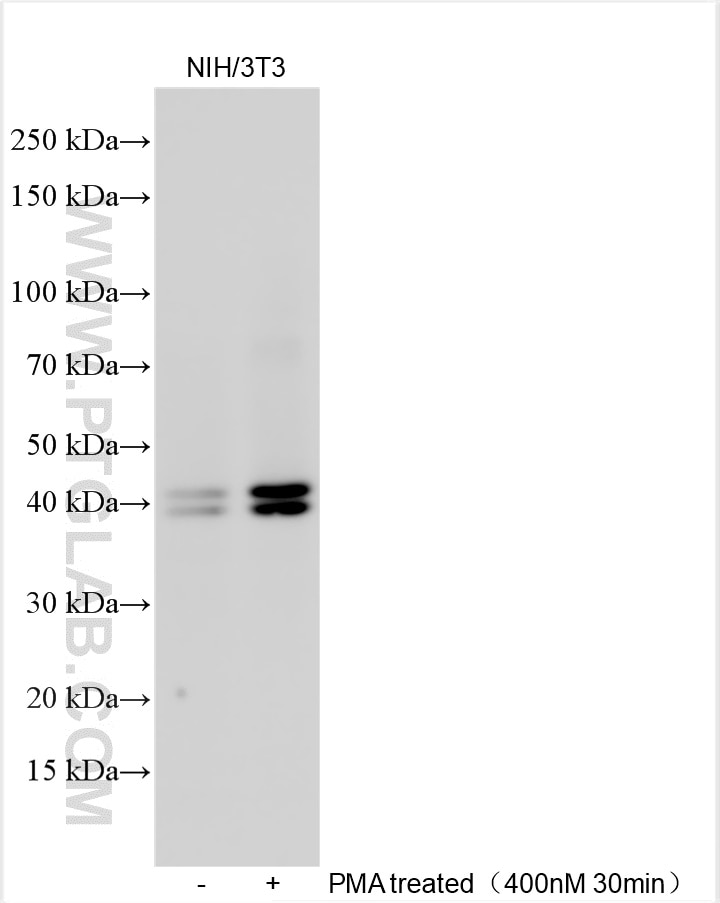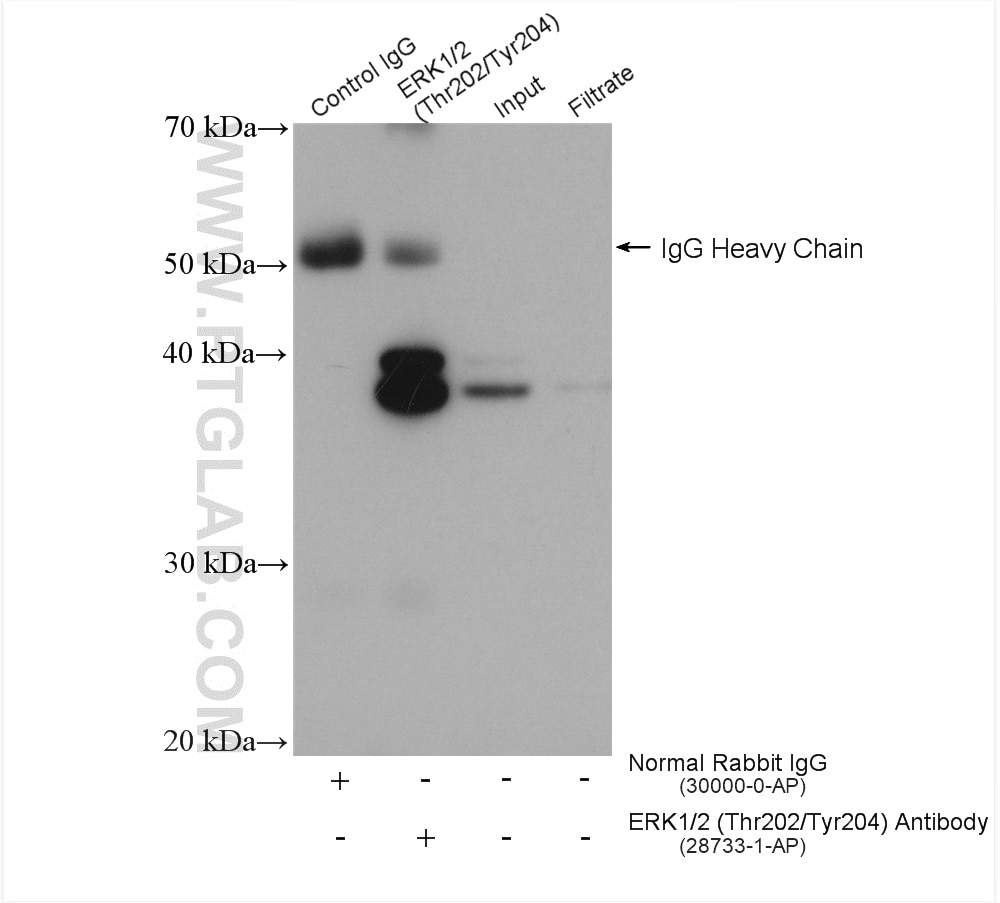Tested Applications
| Positive WB detected in | NIH/3T3 cells, Calyculin A treated HEK-293T cells |
| Positive IP detected in | Calyculin A treated PC-3 cells |
Recommended dilution
| Application | Dilution |
|---|---|
| Western Blot (WB) | WB : 1:1000-1:4000 |
| Immunoprecipitation (IP) | IP : 0.5-4.0 ug for 1.0-3.0 mg of total protein lysate |
| It is recommended that this reagent should be titrated in each testing system to obtain optimal results. | |
| Sample-dependent, Check data in validation data gallery. | |
Published Applications
| KD/KO | See 1 publications below |
| WB | See 527 publications below |
| IHC | See 31 publications below |
| IF | See 19 publications below |
Product Information
28733-1-AP targets Phospho-ERK1/2 (Thr202/Tyr204) in WB, IHC, IF, IP, ELISA applications and shows reactivity with human, mouse samples.
| Tested Reactivity | human, mouse |
| Cited Reactivity | human, mouse, rat, pig, chicken, zebrafish, sheep, goat |
| Host / Isotype | Rabbit / IgG |
| Class | Polyclonal |
| Type | Antibody |
| Immunogen |
Peptide Predict reactive species |
| Full Name | mitogen-activated protein kinase 3 |
| Calculated Molecular Weight | 38-43 kDa |
| Observed Molecular Weight | 38-43 kDa |
| GenBank Accession Number | NM_002746 |
| Gene Symbol | ERK1 |
| Gene ID (NCBI) | 5595 |
| RRID | AB_2881202 |
| Conjugate | Unconjugated |
| Form | Liquid |
| Purification Method | Antigen affinity purification |
| UNIPROT ID | P27361 |
| Storage Buffer | PBS with 0.02% sodium azide and 50% glycerol, pH 7.3. |
| Storage Conditions | Store at -20°C. Stable for one year after shipment. Aliquoting is unnecessary for -20oC storage. 20ul sizes contain 0.1% BSA. |
Background Information
Serine/threonine kinase which acts as an essential component of the MAP kinase signal transduction pathway. MAPK1/ERK2 and MAPK3/ERK1 are the 2 MAPKs which play an important role in the MAPK/ERK cascade. They participate also in a signaling cascade initiated by activated KIT and KITLG/SCF. Depending on the cellular context, the MAPK/ERK cascade mediates diverse biological functions such as cell growth, adhesion, survival and differentiation through the regulation of transcription, translation, cytoskeletal rearrangements. The MAPK/ERK cascade plays also a role in initiation and regulation of meiosis, mitosis, and postmitotic functions in differentiated cells by phosphorylating a number of transcription factors. MEK1 and MEK2 activate p44 and p42 through phosphorylation of activation loop residues Thr202/Tyr204 and Thr185/Tyr187, respectively. Several downstream targets of p44/42 have been identified, including p90RSK and the transcription factor Elk-1. This antibody simultaneously recognizes the phosphorylation of ERK1 at Thr202 and Tyr204, as well as the phosphorylation of ERK2 at Thr185 and Tyr187.
Protocols
| Product Specific Protocols | |
|---|---|
| IP protocol for Phospho-ERK1/2 (Thr202/Tyr204) antibody 28733-1-AP | Download protocol |
| WB protocol for Phospho-ERK1/2 (Thr202/Tyr204) antibody 28733-1-AP | Download protocol |
| Standard Protocols | |
|---|---|
| Click here to view our Standard Protocols |
Publications
| Species | Application | Title |
|---|---|---|
Signal Transduct Target Ther Circulating tumor cells shielded with extracellular vesicle-derived CD45 evade T cell attack to enable metastasis | ||
Mol Cancer Cholesterol promotes EGFR-TKIs resistance in NSCLC by inducing EGFR/Src/Erk/SP1 signaling-mediated ERRα re-expression. | ||
Biomaterials Myocardial delivery of miR30d with peptide-functionalized milk-derived extracellular vesicles for targeted treatment of hypertrophic heart failure | ||
Exp Mol Med Helicobacter pylori CagA-mediated ether lipid biosynthesis promotes ferroptosis susceptibility in gastric cancer | ||
Redox Biol Twin defect-rich Pt ultrathin nanowire nanozymes alleviate inflammatory skin diseases by scavenging reactive oxygen species | ||
EMBO Mol Med Luteolin detoxifies DEHP and prevents liver injury by degrading Uroc1 protein in mice |
Reviews
The reviews below have been submitted by verified Proteintech customers who received an incentive for providing their feedback.
FH Charlotte (Verified Customer) (07-15-2024) | The last (most intense) band correspond to pERK. It worked nicely
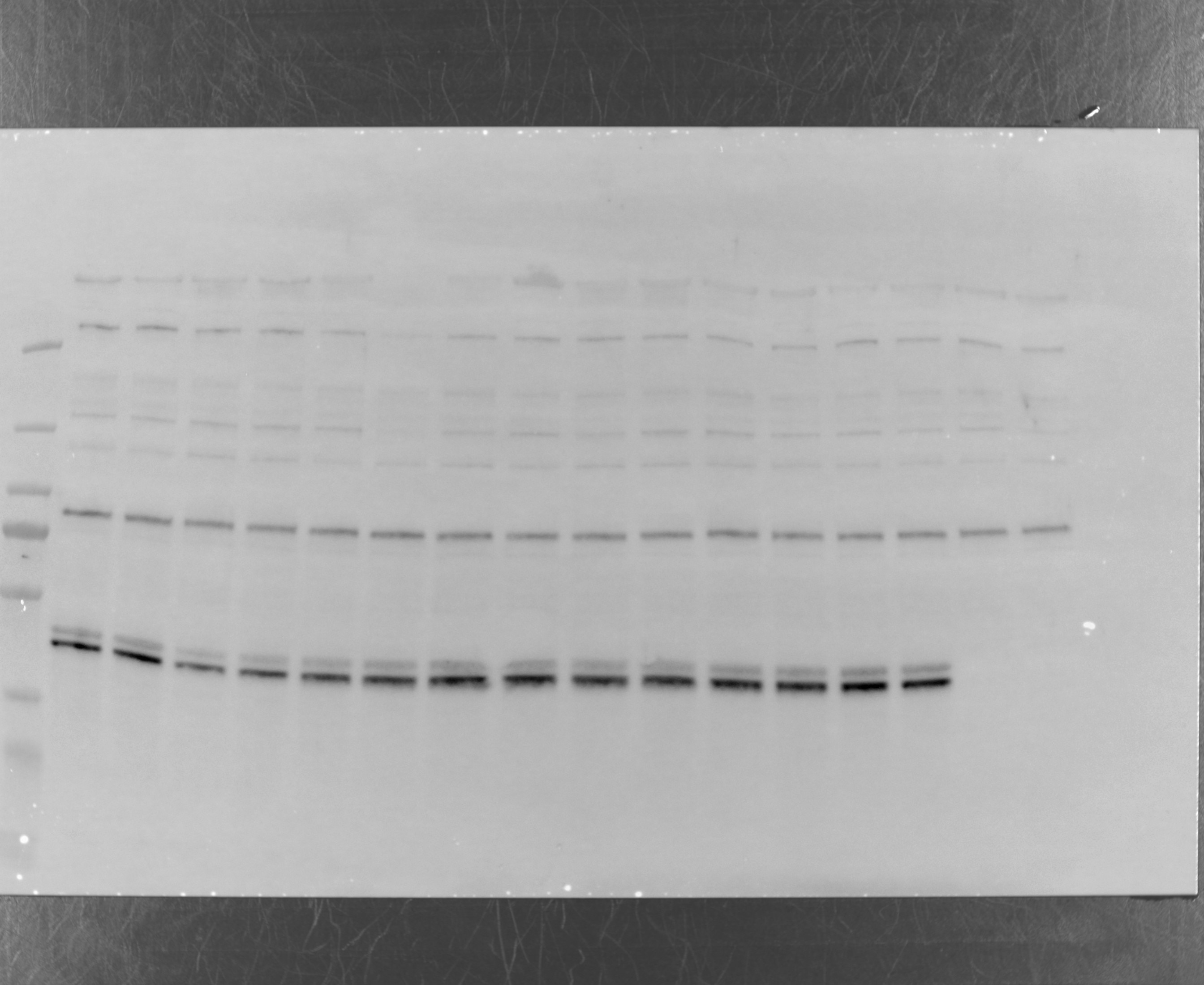 |
FH Alexandra (Verified Customer) (06-06-2023) | P19 cells were aggregated in bacteria petri dishes for 6h (point1) and 12 and 24 h (point 2 and 3) in the presence of 1uM RA (retinoic acid). For neuronal differentiation the RA treatment lasts for 4 days, the cells are trypsinized and cultured in serum free neurobasal medium supplemented with N2, glutamax and penstrep. Cell aggregates were collected by centrifugation, washed in 1X PBS and lysed in denaturing lysis buffer. For WB i used PVDF, blocking in 5%milk and the antibody incubation was O/N at 4C. Please do not include the Parp1 KO annotation if you will use this data. In the PDF you can find the ladder and the exposition as well. If the data did not get uploaded (i cannot tell) let me know and i will send it by email.
|
FH Macarena Lucia (Verified Customer) (10-17-2022) | nice band
|

